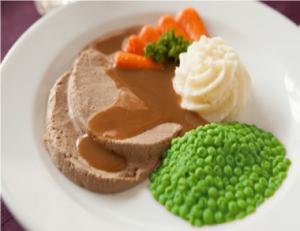Eating and drinking independently after a stroke tastes the best!
I would like you to imagine, for a moment, how you would feel if you were suddenly struck down with a stroke - seemingly coming from nowhere in the space of a moment, and with potentially life changing consequences – not just for you who is immediately affected, but also for your loved ones.
After all, shaky hands, limited movement in your neck and/or potential paralysis down one side of your body, would make it nearly impossible for you to eat and drink independently. And having to have someone assist you with your meals, or face spilling food on a table or yourself, can be embarrassing and have a negative effect on your self-esteem and even lead to you refusing to eat.
Dealing with the aftermath of a stroke can be physically and emotionally stressful. Depending on the severity of the stroke, you may lose some of your mental and physical abilities. Some of your abilities may return over time, while others may not. You need to relearn and practice every day movement sequences - which include eating and drinking, to help promote dignity, independence and the enjoyment of food once again.
Here we talk about some of the ways a stroke can affect normal eating, and offer you our tips and solutions to help overcome them:
 Pureed food can be easier to swallow for those at risk of choking.
Pureed food can be easier to swallow for those at risk of choking.
If you have trouble swallowing - you may choke, cough, or gag while you eat, or find that liquid comes out of your nose when you try to swallow. It usually gets better over time, but a few tips can help:
- Stick to soft and pureed foods like cooked cereal, mashed potatoes, soup, cottage cheese, and apple sauce, as they are all easier to eat. Alternatively, our innovative range of silicone food moulds are also amazing to help improve the presentation of pureed foods.
- If you want to try tougher foods, cut them into small pieces or chop them in a blender to make them easier to chew.
- Thicken your liquids. It’s important to drink enough fluid to avoid dehydration. But when you have swallowing difficulties, you are at high risk of aspiration, when water and other thin liquids can accidentally enter your airways or lungs and cause serious health problems such as pneumonia. We have range of drinks thickeners and drinking beakers with spouts suitable for thickened fluids.
- Get a referral to a Speech and Language Therapist. They will be able to guide you through exercises to strengthen your tongue, lips, throat, and mouth muscles, which will help you swallow. They may also recommend prescription medications like muscle relaxers, which can open your throat and make swallowing easier.
 These clever handles can help those who can not hold traditional cutlery handles.
These clever handles can help those who can not hold traditional cutlery handles.
If using cutlery is a challenge - a stroke can make the muscles in your arms or hands weaker, which makes it hard to use traditional forks, knives, and spoons. Try:
- Cutlery with larger and thicker handles which are easier to hold. You can switch to a knife with a curved blade that allows you to cut food with one hand or a ‘splayed fork’ which acts like a spoon and a fork in one for single handed eaters.
- Plate guards help you to scoop food against a wall on the plate while you eat with one hand.
- Non slip mats can be placed under your plate or bowl to keep it from sliding.
- Or you can unite the plate guard and non-slip mat with a plate or bowl with our brilliant Sloped Base Plate or Bowl with a sloped interior, a discreet protruding lip and a nonslip base for single-handed eating .
- Adaptive kitchen equipment - You may need special tools to help you cook one-handed, such as easy-grip scissors, battery-powered peelers, and specially designed cutting boards.
Our colourful and functional range of Ornamin tableware, with its supportive features, compensate for just these types of disability, and can help to facilitate independent and carefree eating and drinking. They hold products securely in place on the table, prevent them from slipping out of hands and, like an invisible second hand, allow people with just one hand to eat on their own with ease.
For more details head over to our website and check out our full range of dignified dining solutions or give us a call on 01773 713713.



